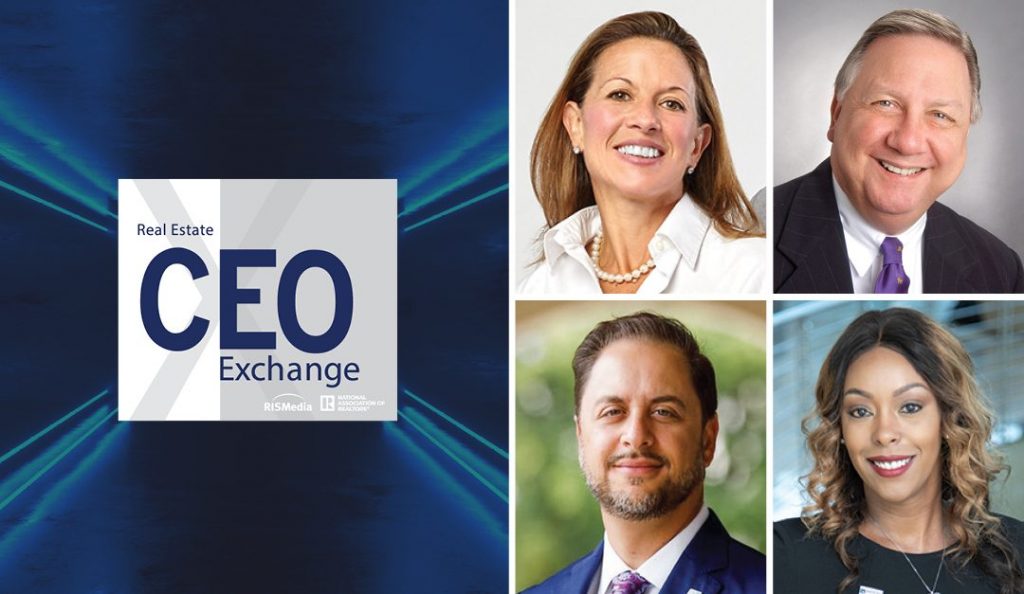The first-ever virtual CEO Exchange, held on Sept. 17 and co-presented by the National Association of REALTORS® (NAR), featured top industry professionals coming together to discuss a wide range of topics, from strategies for adapting their business models in today's climate to the effects COVID-19 has had on real estate. Among a riveting Q&A with NAR's Bob Goldberg and Vince Malta, and a multitude of educational strategy sessions, was a brilliant group of industry pros discussing how to navigate the ever-changing landscape of real estate.
Moderator Larry Flick V, CEO of Berkshire Hathaway Fox & Roach, opened the panel "Forging Ahead: Navigating a New Consumer Environment" by explaining that amid the wake of the coronavirus, buyers and sellers are faced with new challenges, such as deciding whether or not to list their homes and buying properties without ever setting foot in the door. This panel went on to explore how to meet today's new consumer demands, and how real estate professionals can capitalize on the unique opportunities of this time.
Flick directed the first question to Whitney Finn LaCosta, owner and broker of Coach REALTORS®, asking her to share the impact of the coronavirus pandemic on buyers and sellers in her marketplace.
"I think, right now, the buying and selling public is behaving drastically different than they did at the height of the pandemic here in New York," stated LaCosta, who went on to illustrate the differences between the mindset of consumers back in March and April compared to the new opportunities they are now exploring.
As consumers and agents adapt through this pandemic, it is to be expected that some of these approaches will continue long term. Bob Hale, president and CEO of the Houston Association of REALTORS® (HAR), has noticed these changes on both the consumer and agent sides. "We're going to see a much larger move from the physical world to the digital," he said.
"We're going to see e-signatures become commonplace, automated valuations versus appraisers in the home, digital documents versus mounds of papers at closing and virtual notaries using Zoom or Facebook live."
The focus then shifted from incorporating digital strategies for a more efficient home-buying process to a discussion about marketing and how real estate professionals need to adjust their messaging to reach consumers.
"The consumer mindset has been changed. We communicate more virtually through our marketing message; we provide better information," said JP Piccinni, founder of JP & Associates REALTORS®.
Piccinni continued by outlining how the new processes of buying and selling a home will continue into the future, post-coronavirus, as will adapting to the new generation of homebuyers. "We've adapted to how millennials buy homes,” he said. “COVID has really trained us in how to deal with Generation Z buyers, who aren't going to want to talk to a lot of people. The trend moving forward is that the agents and the consumers will be communicating a lot more virtually."
Efficiency and productivity are two positive impacts that the panelists all agreed came from the COVID-19 pandemic. Because of this advanced technology, paired with the time available to learn and educate, more agents were able to sell homes at a time where many thought another housing crisis would occur.
The new forms of communication, as well as the new wave of technology and increasing relevance of social media, will play a large part in the experience that both an agent and a consumer will expect in the future, immediate and post-pandemic.
"Video and social media are now more important than ever," said Kendall Bonner, owner and broker of RE/MAX Capital Realty. "It's a huge opportunity."
Bonner went on to detail how utilizing social media and video as an agent can improve communication in a unique and effective way. She coined the term "digital door knocking" and explained how providing educational content in the form of video allows real estate professionals the opportunity to convey an entertaining and convenient experience while connecting with more people in less time.
"If a good video lives online, it can be watched by hundreds or thousands of people at their convenience," Bonner said. "The future is—not just during this pandemic, but beyond—about doing more with video, doing more with social media and using technology to create an experience that is enhanced for our customers and allows them to get to know, like and trust us."
The panel also discussed the lessons learned throughout this pandemic and how they can be applied in the future. From utilizing and embracing the technology available to adapting to a new way of doing business by marrying modern strategies with traditional systems, agents are equipped with even more tools to communicate, educate and navigate with consumers in today's unique and unprecedented environment.







